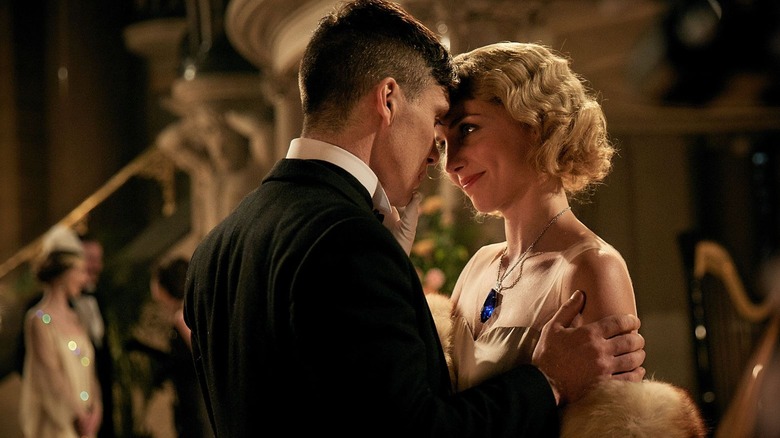Peaky Blinders' Creator Intentionally Keeps His Characters Off The 'Road To Happiness'
From the onset of "Peaky Blinders," we're shown how Cillian Murphy's Tommy is grappling with his deteriorating mental state, stemming from his struggles with post-traumatic stress disorder since his return from his time serving in the war. Throughout the series, we watch as Tommy's mental health turns for the worse, gets better, and worsens again. His inner turmoil from fighting in the First World War never ceases to exist; it overwhelms him repeatedly and threatens to seep into and impact his day-to-day life.
While other characters in "Peaky Blinders" aren't necessarily going through mental turmoil of identical gravity as, say, Tommy's, most characters are battling demons of their own in the hope that one day the path will lead them to some happiness. While the characters don't permanently lose hope to make things better, it was never the creator, Steven Knight's intention, for them to be happy.
'He was frozen inside'
"Peaky Blinders" creator Steven Knight, in conversation with PeakyBlinders.tv, shared that Tommy's past had had a severe effect on his mind, and it was near impossible for him to escape it. He was shut down emotionally for a long time — and even though he fell in love and things changed for the better, tragedy has always awaited the character. Tommy became hard and brutal because he had seen the worst of humanity in the war, and he was "frozen inside," as many who experience the trauma of war do, said Knight.
"During really horrific war situations, human beings change very quickly. Some part of the subconscious decides 'If you're going to survive, you've got to be like this' so that's who you become – hard and brutal and all of those things that happen to soldiers. When Tommy got back, he couldn't stop that. He was frozen inside, like a lot of people who've suffered the trauma of war."
Knight further explained how when Tommy met Grace (Annabelle Wallis) and fell in love with her, he allowed her presence to transform his life — even if momentarily. Her death knocked him back to the ground, hastening his mental downfall.
Tragedy awaits everyone
Knight continued, explaining how he had a roadmap for all his characters: he offered them "a road to happiness" before taking it away. It feels like an interesting exercise in testing the limits of a character — to see how they pick up the pieces when life doesn't give them a break. Like Tommy and Grace, Knight said that he tried to explore a similar arc with Aunt Polly (Helen McCrory) and Aberama Gold (Aidan Gillen).
"What I keep doing with these characters is offering them a road to happiness and then blowing the bridge up and not letting them go down it. Polly too, would have been happy perhaps with Aberama, but then he's taken away from her as well."
Most of the Shelby family members are experiencing devastating mental struggles — along with Tommy and Polly losing their loved ones, there's also Arthur and other Peaky Blinders gang members who served in the war, and exhibit symptoms of PTSD, and are triggered by distressing memories and loud sounds. "Peaky Blinders" sensitively handles its characters' mental health struggles. It is never unrelatable or gratuitous, and the writing is always empathetic toward its characters, for which the show has been repeatedly praised.


